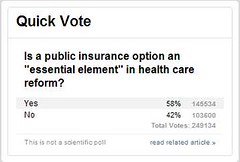Correct me if I'm wrong, but wasn't the intent of Cash for Clunkers to stimulate domestic auto manufacturing by increasing sales (along with taking old gas-guzzlers off the road)? Oh, that's right, I forgot that when Democrat Betty Sutton proposed restricting the cash coupons to cars made in the U.S., foreign manufacturers threw a fit.
"The (Sutton) bill as written is unfairly protectionist," said a spokesman for Mazda North America.
"Any program must treat all manufacturers equally, regardless of where their corporate headquarters is located," said a spokesman for Volkswagen in the United States.
Foreign automakers got their way and it paid off handsomely, particularly for Toyota, which sold nearly 1 out of every 5 cars that were purchased. A "Thank You" would have been nice, along with a vow to treat workers "equally" with their domestic counterparts. Instead, this is how Toyota returned the favor for its uptick in U.S. market share.
Toyota said it would close its New United Motor Manufacturing Inc. plant in Fremont, Calif., in 2010, after General Motors decided to pull out of the 25-year-old joint venture as part of its broad reorganization plan. The NUMMI plant employs 4,500 UAW-represented autoworkers and an estimated 35,000 supplier and other spin-off jobs are expected to be indirectly impacted.The NUMMI plant is also their only UAW facility in the country, which probably played a roll in their decision, especially considering the now-infamous memo from several years ago where Toyota's brass expressed their concern that "workers’ wages are growing faster than the company's profits." To rectify this situation, Toyota announced their newest plants would pay workers based on "local manufacturing wages" – not UAW scale. That's doublespeak for low wages in right-to-work states.
It doesn't appear Toyota bargained in good faith with the UAW either. As far back as 2007, the UAW started making nice with management, offering proposals for the increased use of temporary employees and other cost-cutting measures. And, according to this NUMMI employee, "'there’s plenty of blame to go around' and the union knows that they aren’t wanted. However, "the union has generally been willing to do their part to support the company. Toyota just hasn’t negotiated anything with the union. Our contract ended last month."
I've resigned myself to the fact that globalization is here to stay and people are free to spend their money where they want, but as Peter De Lorenzo wrote in The United States of Toyota...
Toyota earned a $13.2 billion profit in 2006. And where, exactly, did those profits go? It seems there's one very big thing that isn't American about Toyota, and that is where those profits go at the end of the day. To me, that makes Toyota a Japanese company, plain and simple. A company that is now inexorably woven into the fabric of this country, but a Japanese company nonetheless.The profits earned by Honda, Mazda, Hyundai and other foreign manufacturers go back to their respective countries too. It infuriates me that these companies are given free access to the U.S. auto market, yet their home countries aren't as open, imposing higher tariffs and restrictions on the number of imported vehicles allowed. And, adding insult to injury, they intentionally strive to drive down the wages of American workers by locating in low wage, right-to-work states where they usually receive large tax subsidies to build their plants. I don't know about you, but I don't allow guests to dictate how I run my household, and I don't find myself inclined to buy these companies cars because I know that it comes with a price to my fellow Americans.
In Toyota's case, their lack of respect for American workers and families may be coming back to haunt them. According to Freep columnist Sarah Webster, the automaker is facing a lawsuit that could be a public relations nightmare, and "a former Toyota attorney is accusing the automaker of illegally withholding evidence in hundreds of rollover death and injury cases, in a "ruthless conspiracy" to hide evidence of "its vehicles' structural shortcomings."
Americans have opened their wallets to Toyota and other foreign automakers for decades, but maybe it's time for people to ask just what we've gained in return. I just don't see the benefits.
(Cross-posted at Blogging for MI.)


